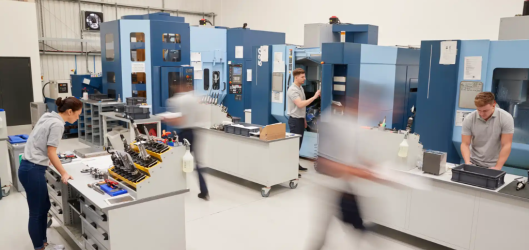
High employment costs are now outstripping energy costs as the most cited source of pressure to raise prices, according to a new report from Enginuity.
Skills shortages – where the labour is available but not with the right skills for the role – are also hampering business growth and causing SMEs to hold back on investment. The vast majority, 80% of the SMEs (Small and medium firms), that engaged in the research experienced difficulties finding suitable staff during recruitment in the last six months.
Only 15% of SMEs think that the UK labour market is attractive, and only 24% said that labour and skills shortages have not affected their business.
Enginuity produced this report to help employers in the manufacturing and engineering sectors to close the skills gap. The report captures insight from 135 manufacturing and engineering micro and SMEs from across the UK, who represent 6,500 employees and £1.1 billion pounds worth of sales.
The report’s author, Poppy Bramford, Enginuity’s Policy Manager, said “This report is a striking confirmation of how severely the skills system is failing the majority of engineering and manufacturing SMEs, stifling their ability to grow. Despite significant increases to employment costs, SMEs remain determined to keep investing in training. Whilst the Government wants to see increases to employer investment in skills, barriers keep SMEs locked out of the skills system that would enable them to do so. For SMEs to realise the ambitions of the UK Government on economic growth, the skills landscape must move beyond policy chop and change by injecting longevity and SME engagement into policy creation.”
Report Key points:
Labour costs are driving up prices
- Almost 9 in 10 (89%) of SMEs identified labour costs as a source of pressure to raise prices.
- Labour costs significantly out ranked energy and utilities (57%) as the second most commonly identified source of pressure to raise prices.
- To offset rising costs, the vast majority of SMEs plan to pass on costs to customers (76%), demonstrating the inflationary ripple effect of rising employment costs.
- 37% said that they would pause capital investment to offset rising costs and 33% said they would freeze recruitment.
The labour market and skills system are not working well for the majority of SMEs
- Only 24% of SMEs said that labour and skills shortages have not affected the business and that they have not had difficulties filling vacancies.
- Only 15% of SMEs agree or strongly agree that the UK labour market is attractive.
- The two biggest threats identified by employers to the competitiveness of the UK labour market are skills shortages, where the labour is available but not with the right skills for the role (73%) and labour costs (70%).
- 80% of SMEs experienced difficulties finding suitable staff during recruitment in the last 6 months.
Awareness of the 2025 Industrial Strategy and the Advanced Manufacturing Plan is high, with 79% of SMEs stating they’ve heard of it, but they remain divided about whether these announcements have changed the outlook for their business over the next 12 months.
More information about the report can be found on the Enginuity website.



